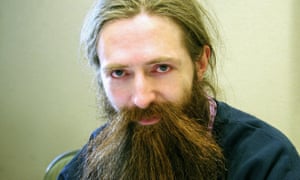Categories
Archives
- June 2024
- May 2024
- July 2023
- May 2022
- March 2022
- February 2022
- November 2021
- March 2021
- May 2020
- April 2020
- March 2020
- February 2020
- January 2020
- December 2019
- November 2019
- October 2019
- September 2019
- August 2019
- July 2019
- June 2019
- May 2019
- April 2019
- March 2019
- February 2019
- January 2019
- December 2018
- November 2018
- October 2018
- September 2018
- August 2018
- July 2018
- June 2018
- May 2018
- April 2018
- March 2018
- February 2018
- January 2018
- December 2017
- November 2017
- October 2017
- September 2017
- July 2017
- March 2017
How to live forever: meet the extreme life-extensionists
How to live forever: meet the extreme life-extensionists
Some sleep on electromagnetic mats, others pop up to 150 pills a day. But are life extensionists any closer to finding the key to longevity? Alex Moshakis meets some of the people determined to become immortal

In 2016, an American real-estate investor named James Strole established the Coalition for Radical Life Extension, a nonprofit based in Arizona which aims to galvanise mainstream support for science that might one day significantly prolong human life. Standards in modern medicine are allowing us to live longer now than ever before. But that is not Stroles concern. What good are a few more measly years? He is interested in extending life not by days and weeks, but by decades and even centuries, to the degree that mortality becomes optional an end to The End. The deathist paradigm has to go, a line on the Coalitions website reads. Its time to look beyond the past of dying to a future of unlimited living. It describes its supporters as early-adopting advocates, numbering in the thousands.
Life extensionists (or longevists, or immortalists) fit neatly into two types. The first are rationalists: scientific researchers at the coalface of gerontology, the study of ageing, chipping away at the many technical difficulties of ending entropy. Strole is the second type. A businessman, he has no formal scientific training, but is nevertheless resolutely committed to the cause, eager to rally behind new findings. He hopes to live indefinitely, or at least until 150. But he is ultimately reliant on researchers finding a way. Consider him less a gerontological groupie than a politely optimistic mega-fan, sitting on the sidelines of science, willing on a major breakthrough.
He isnt alone. Life extensionists have become a fervent and increasingly vocal bunch. Famously, the community includes venture capitalists and Silicon Valley billionaires, non-gerontologists all, and nearly all men, who consider death undesirable and appear to have made so much money they require infinite life in which to spend it. But now mere mortals are joining the throng, heads filled with fantasies of forever. Humans have lusted after immortality for as long as they have been alive. So far the quest has been unsuccessful we still die! But good news: paradise is reported to be closer now than ever before, and private clinics and online pharmacies are promising to help get us there, there being the future, all of it.

Strole has been an evangelist of human immortality since he was a child, when his grandmother died, and he felt a pain you cant even describe, its so deep in your gut. He was 11, still new to the world, and he came to think of death, like most of us do at some point or another, as deeply unfair.
In the early 1970s, when he was in his 20s, he began touring the US as a public speaker, sharing what was then limited gerontological research, but nevertheless extolling its possibilities and advocating the anti-ageing benefits of a positive mindset: Isnt life great? You can live forever if you really try! Because Strole is not scientifically accredited, he mostly based his patter around inspirational healthy-living tips, much of which would now fall under the umbrella of common-sense wellness: exercise, eat well but not too much, look after yourself. But still his message seemed radical, and he was not always well-received. Audiences wary of Stroles ideas condemned him for testing Gods will, or disrupting the natural order. His concepts ran counter to the common world view that we live and then we die. Particularly aggravated spectators referred to him as the devil. Every now and then he received death threats.
Nevertheless, he persisted. He considered himself fortunate to work in a field that meant he was privy to insider information and he became convinced a significant breakthrough was around the corner. To fully prepare his body for the rigmarole of centuries-long life, he adopted a strict health regimen. He fasted, juiced, cleansed and devoured supplements, inviting audiences to do the same. Eventually, a community formed, driven by a shared, urgent aversion to death. We felt then how important it was to do everything you could to stay alive, he says
Strole is now 70. He lives in Scottsdale, Arizona, a desert town. In the life-extensionist mode, he avoids dairy and rarely touches bread, though he devours a whole heap of other things. Recently his diet has included pills, branded Cognitive, which he takes twice a day and claims have all sorts of nourishing effects on his brain. (What good is maintaining the body if not the mind?) The pills are part of a self-directed anti-ageing process that requires a lot of swallowing. On some days, Strole takes 70 supplements, including a tablet that energises the mitochondria (mitochondria produce energy) and whose effects resemble a shot of coffee, minus the jitters, as well as vitamins, multi-nutrients and metformin, a diabetes drug that has become so popular among life extensionists that one referred to it as the aspirin of anti-ageing. In the early mornings, when the Arizona air is still brisk, he takes a cold dip in his pool to shock his immune system into better function, and at some point or another he lies face-up on an electromagnetic mat that whirs silently against his body and opens up the veins, and engages in a breathing regime that, he says, balances the hormones.
These are typical life-extension strategies, though most people supplement regimens with their own ideas. Some fast. Others arrange expensive stem cell replacement therapies. To maintain a supple mind, the gerontologist Marios Kyriazis, who is in his 60s and heads the British Longevity Society, reads the newspaper upside down, and whenever that becomes too easy, he reads the newspaper upside down and reflected in a mirror. Think of it as an alternative to Sudoko.

What good is all of this? The current life-extensionist strategy is twofold. First, achieve a wellness foundation, Strole says. Second, stay alive until the coming gerontological breakthrough. All that is required is to live long enough for the next innovation, and presuming you do, You can buy another 20 years. Twenty years here, 20 years there, it all adds up, and suddenly youre 300. This is a common view. Last year the British billionaire Jim Mellon, who has written a book on longevity, titled Juvenescence, said: If you can stay alive for another 10 to 20 years, if you arent yet over 75 and if you remain in reasonable health for your age, you have an excellent chance of living to more than 110. To most, 110 seems a modest target. Why not forever? Its not some big quantum leap, Strole says, by way of explanation. He invokes the analogy of a ladder: step by step by step to unlimited life. In 2009 the American futurist Ray Kurzweil, another supplement enthusiast, coined a similar metaphor, referring instead to bridges to immortality.
Where to begin with the almighty question: why would anyone think this a good idea? Strole is openly afraid of death (who isnt? He argues), though he seems more motivated by a kind of curiosity. We live our lives knowing they will one day end. Imagine what we might accomplish if they didnt. (It is not clear exactly what Strole might actually want to accomplish: self-actualisation? World peace? That tricky jigsaw?) The American entrepreneur Dave Asprey, who is 46 but hopes to live beyond 180, and who takes 150 supplements a day, told me: I cant imagine running out of exciting new problems to solve!
This motivation is common the burning desire to help and it can be seen as morally virtuous or horribly presumptuous, depending on your opinion on the altruistic potential of a bunch of disproportionately wealthy, middle-aged men. (Is it possible the future will become a refuge for the rich, who experience life as a sequence of exquisite events and who might not understand the concept of entropy as relief or escape?) Few life extensionists openly admit to hedonistic impulses. You can only smoke so many Cuban cigars, Asprey says, before youre like, Ive got to buckle down. Though when I asked the British gerontologist Aubrey de Grey why indefinite life appeals, he replied, half-joking: My hot tub.

De Grey, a serious scientist, considers life extension a health issue, which is perhaps the fields most convincing argument. Gerontologists are not hoping to end death, he says. Instead, Were interested in people not getting sick when they get old. No matter how much society rails against the concept of immortality, nobody really wants to suffer through Alzheimers, or suddenly fall foul of cardiovascular disease. Gerontology is the act of developing treatments for age-related diseases, de Grey argues of reducing the causes of death, not death itself. The benefits of living longer are not the point, he says. The benefits are not having Alzheimers disease. For de Grey, indefinite life is a by-product, not a goal.
Are we anywhere near to a breakthrough? So far, research has produced modest yields. Gerontologists speak prophetically of potential, but most warn a significant human development remains somewhere far off in the distance almost in sight but not quite. Richard Hodes, the director of the National Institute of Aging, a US government agency, told me that, though research in animals has led to dramatic increases in lifespan, some of them multi-fold, There has been far less quantitative effect as those models have moved towards mammalian species. The biologist Laura Deming, who in 2011 established the Longevity Fund, a venture capital firm that supports high-potential longevity companies, told me that startups continue to successfully root out biological markers of ageing inefficient cells, mitochondrial decline but that, in humans, We really dont know right now what will work and what wont.
Much of gerontology focuses on identifying types of damage that accumulate with age and developing ways to halt or reverse that accumulation. It has been discovered, for example, that as we grow older, certain cells become ineffective but nevertheless stick around, getting in the way like comatose guests at the end of a house party. Removing those cells have helped mice have longer, healthier lifespans (this is called senescence.) Similar forms of genetic engineering have been successful in other animal models. But to reach the mainstream, gerontologists must convince government agencies to support human adoption, a complicated and long-winded task, given the general view that death is a normal human process. Why play God?
In any case, it is likely that one single longevity strategy alone wont help us much. Life extensionists enjoy a metaphor: humans are complicated machines, they say, like cars, but mushy. And what happens to a machine if you dont look after it? It rusts. It splutters and spurts, until it reaches its inevitable conclusion. De Grey considers ageing a multifaceted problem. Humans incur many different types of damage. We dont just rust. We scratch. We dent. Rubbish accumulates in our footwells and grime develops in our engines. We require multiple strategies of repair constant fine-tuning. Whats the point in removing those senescent cells if that molecular junk continues to build up?
De Grey shares Stroles belief that innovations are coming. But, unlike Strole, he considers current strategies almost pointless. He does not take hundreds of supplements. He does not pay for stem-cell transfusions. I want to wait and see, he says. At 56, he is content to sit tight for treatments that have become progressively more effective so I dont have to use clunky, first-generation therapies that may have side-effects.
This does not seem to bother Strole, nor others in the community. Time is running out! Bring on the treatments! At RAADfest, the Coalitions annual conference the Woodstock of radical life extension visitors are invited to root through the latest in anti-ageing products, of which there are many. Try DHEA PRO-25, an anti-ageing hormone. Or NAD+PRO, advertised to boost physical and mental energy. Or Piracetam, from the family of smart drugs, or nootropics, which claim to enhance brain function. Strole named the area: The marketplace of your future. It is popular among RAADfest guests for the power of its promise: the opportunity to realise the hoped-for self. This is Wellness 2.0 beyond the cosmetic. We have been anti-ageing our skin for years. Why not our insides, too?
Jim Mellon is reported to have described the longevity market as a fountain of cash, and has urged friends to invest. Business is already lucrative, but it is a market that appears to take little notice of efficacy. The majority of anti-ageing products remain unregulated patent pending, in the vernacular and more than a few appear utterly useless. Earlier this year, the US government released a statement condemning the anti-ageing fad of transfusing young blood into older bodies, a practice researchers have proved effective in mice but which, the FDA said, should not be assumed to be safe or effective in humans. (The treatments cost thousands of dollars, and led to concern that Patients are being preyed upon by unscrupulous actors.)
A decade ago, the American Association of Medicine publicly condemned the sale of anti-ageing hormones, an industry that was reported to be worth $50bn. Despite the widespread promotion of hormones as anti-ageing agents by for-profit websites, the association said, the scientific evidence to support these claims is lacking.
The oldest person to have lived, Jeanne Calment, reached 122, though she was perhaps not the greatest example of good health: she smoked until she was 117. The most successful life-extension methods we know of seem to be those we have known all along: eat well, sleep well, exercise, reduce stress and rely on modern medicine, which has prolonged average lifespans significantly over the past 160 years.
Strole does that and more. So far its working, he says. He is 6ft 4 and 13st the perfect weight with a slick of glossy grey hair. Perhaps his regimen is effective. Or, perhaps, like Calment, he has won a kind of genetic lottery, his healthy hair predisposed. It is difficult to say exactly, but, as of this moment, he will die. What happens if a breakthrough doesnt arrive in his lifetime? Well, then were in a little bit of hot water, he says. But its better to go for it than to not go for it. Its better than just settling in. Dont go quietly into the night.

